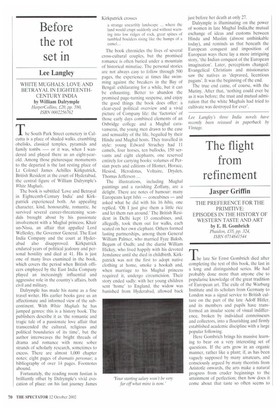Before the rot set in
Lee Langley
WHITE MUGHALS: LOVE AND BETRAYAL IN EIGHTEENTHCENTURY INDIA by William Dalrymple HarperCollins, £20, pp. 580, ISBN 0002256762 The South Park Street cemetery in Calcutta is a place of shaded walks, crumbling obelisks, classical temples, pyramids and family tombs — or it was, when I wandered and played there as an eight-yearold. Among those picturesque monuments to the departed is the last resting place of Lt Colonel James Achilles Kirkpatrick, British Resident at the court of Hyderabad, the central figure of William Dalrymple's White Mughals.
The book is subtitled 'Love and Betrayal in Eighteenth-Century India' and Kirkpatrick experienced both. An appealing character, kind, honourable, romantic, he survived several career-threatening scandals brought about by his passionate involvement with a Mughal princess, Khair un-Nissa, an affair that appalled Lord Wellesley, the Governor General. The East India Company and the court at Hyderabad also disapproved. Kirkpatrick endured years of political jealousy and personal hostility and died at 41. His is just one of many lives examined in the book, which covers the period when British officers employed by the East India Company played an increasingly influential and aggressive role in the country's affairs, both civil and military.
Dalrymple has made his name as a fine travel writer. His earlier books gave us an affectionate and informed view of the subcontinent. With White Mughals he has jumped genres: this is a history book. The publishers describe it as 'the romantic and tragic tale of a passionate love affair that transcended the cultural, religious and political boundaries of its time', but the author interweaves the bright threads of drama and romance with more sober strands of scholarly research, sometimes to excess. There are almost 1,000 chapter notes; eight pages of dramatis personae; a bibliography of over 14 pages. Footnotes abound.
Fortunately, the reading room fustian is brilliantly offset by Dalrymple's vivid evocation of place: on his last journey James
Kirkpatrick crosses
a strange unearthly landscape ... where the land would erupt suddenly and without warning into low ridges of rock, great spines of tumbled boulders rising like the humps of a camel...
The book chronicles the lives of several cross-cultural couples, but the promised romance is often buried under a mountain of historical minutiae. The personal stories are not always easy to follow through 500 pages, the experience at times like swimming against the breakers in the Bay of Bengal: exhilarating for a while, but it can be exhausting. Better to abandon the promised page-turning suspense, and enjoy the good things the book does offer: a clear-eyed political overview and a vivid picture of Company life: the 'factories' of those early days combined elements of an Oxbridge college and a Mughal caravanserai, the young men drawn to the ease and sensuality of the life, beguiled by their Hindu and Mughal hosts. They travelled in style: young Edward Strachey had 11 camels, four horses, ten bullocks, 150 servants and eight elephants, one reserved entirely for carrying books: volumes of Persian poets and editions of Homer, Horace, Hesiod, Herodotus, Voltaire, Dryden, Thomas Jefferson ...
The illustrations, including Mughal paintings and a ravishing Zoffany, are a delight. There are notes of humour: many Europeans kept bibis — concubines — and asked what he did with his 16 bibis, one replied, 'Oh I just give them a little rice and let them run around.' The British Resident in Delhi kept 13 concubines, and, allegedly, took them out for walks, each seated on her own elephant. Others formed lasting partnerships, among them General William Palmer, who married Fyze Baksh, Begum of Oudh; and the diarist William Hickey, who lived happily with his devoted Jemdanee until she died in childbirth. Kirkpatrick was not the first to adopt native clothing at home, smoke a hookah and, when marriage to his Mughal princess required it, undergo circumcision. Their story ended sadly: with her young children sent 'home' to England, the widow was banished from Hyderabad, allowed back just before her death at only 27.
Dalrymple is illuminating on the power of women in late Mughal India,the mutual exchange of ideas and customs between Hindu and Muslim (almost unthinkable today), and reminds us that beneath the European conquest and imposition of European ways there lay a more intriguing story, 'the Indian conquest of the European imagination'. Later, perceptions changed: Evangelical Christians and missionaries saw the natives as 'depraved, licentious pagans'. It was the beginning of the end.
The true end came, of course, with the Mutiny. After that, 'nothing could ever be as it was before; the trust and mutual admiration that the white Mughals had tried to cultivate was destroyed for ever'.
Lee Langley's three India novels have recently been reissued in paperback by Vintage.


































































































 Previous page
Previous page